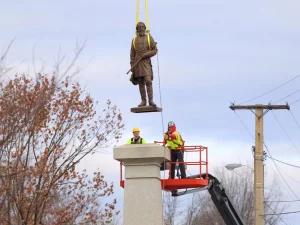This month the last remaining statue of a Confederate War hero, A.P. Hill, was removed in Richmond, Virginia. That concludes a movement that started with the death of George Floyd in the summer of 2020, with the series of statues on Monument Avenue being taken down one by one. The last statue on that street, of Robert E. Lee, was removed last year. The statues, erected during the Jim Crow South, celebrated the “Lost Cause”, the idea that the Civil War was fought over states’ rights and not slavery. The A.P. Hill statue took longer to remove because he was buried under the monument and Hill’s descendants filed a lawsuit against its removal. According to Richmond’s mayor, Levar Stoney, “Over two years ago, Richmond was home to more confederate statues than any city in the United States. Collectively, we have closed that chapter. We now continue the work of being a more inclusive and welcoming place where all belong.”
The hope expressed by Stoney that Richmond (and the US as a whole), had turned a chapter on racism with the reaction to the death of Geoge Floyd has not been fully realized. It was perhaps naïve to think that long established views embedded in willful ignorance and prejudiced worldviews could be changed by clear evidence of the institutional mistreatment of African-Americans, most obviously by the police. But perhaps the removal of statues celebrating slavery and white privilege can help move the needle somewhat. At the least, in Richmond, African-Americans from 2023 on no longer need live among monuments that celebrate their history of enslavement.
